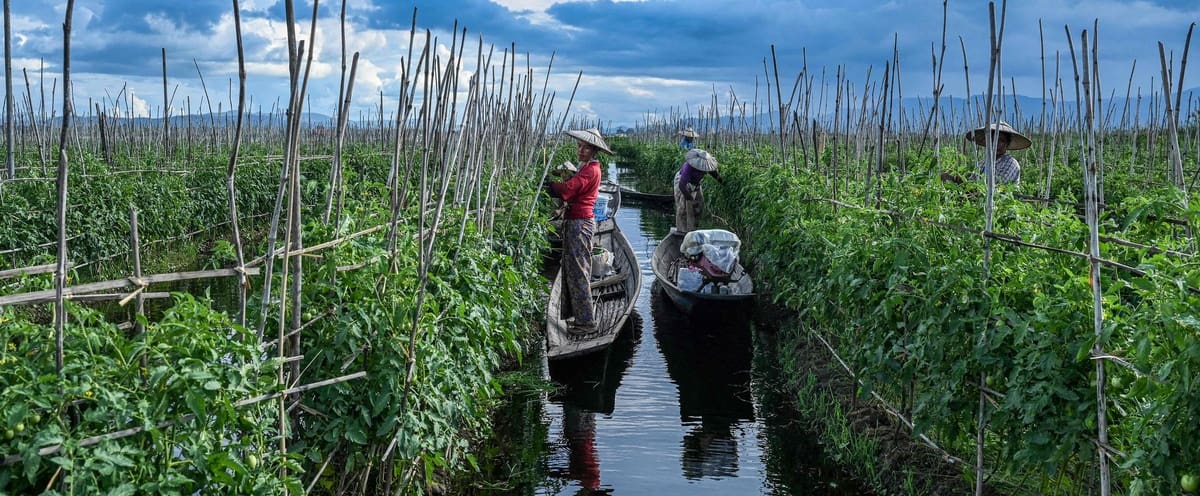On his wooden boat, Nyunt Win navigates between the rows of his floating vegetable garden to harvest the tomatoes for which Inle Lake is famous, a jewel of Burma’s biodiversity.
• Also read: Burma: Fighting blocks key routes, endangering junta revenues
• Also read: Burma: a close ally of the junta jailed for corruption
The UNESCO-recognized natural area is home to dozens of floating fields grown using a vegetable growing technique introduced locally in the 1960s.
The landscape, with the hills of northern Shan State as a backdrop, attracted thousands of tourists before the 2021 coup.

AFP
But residents and authorities fear that uncontrolled agricultural development will slowly suffocate Inle Lake as chemical discharges and floating plant waste engulf its surface.
“We are not rich, but we have enough to live on,” assures Nyunt Win, who earns up to 30,000 kyats (14 euros) for around 16 kg of tomatoes.
The plants rest on a bed consisting of the collection of water hyacinths and supplemented by soil and other components essential for the development of the shoots.

AFP
As these accumulations begin to rot, they will abandon and harden, contributing to the shrinking of the surface area of Inle Lake, whose natural filtering capacities are being overwhelmed by the growth of floating agriculture.
According to the Burmese government, the area of exploited areas increased sixfold between 1992 and 2009.
Floating farms are “destroying” the lake, an official at the Ministry of Agriculture, Livestock and Irrigation told AFP on condition of anonymity.

AFP
The authorities do not have the resources to continue their efforts and contain the problem, he explains.
Chemicals
Farmers like Nyunt Win refute this explanation and point the finger at their mainland counterparts, who are accused of contributing to the siltation of the terrain through decades of slash-and-burn agriculture.
“When I was young, I needed a bamboo pole about 12 feet long to reach the bottom of the water,” explains Nyunt Win.
Now, in the dry summer months, he says he can pick up “handfuls of dirt” with his bare hands.

AFP
Environmental degradation is also causing tensions between farmers and fishermen due to extensive use of water-polluting chemicals.
“When I was a child and went to school, the lake water wasn’t that unhealthy. (…) Now many edible fish have disappeared,” says Nay Tun Oo, a 24-year-old fisherman.

AFP
A 2017 United Nations report found “significant overuse” of chemical fertilizers and pesticides to the detriment of the fragile ecosystem that is home to many species of fish and birds.
The increase in nutrients promotes the spread of invasive species, this report emphasizes.
The shrinking lake and environmental concerns could deter tourists, local business owners fear.

AFP
“No strangers”
Inle Lake, recognized by UNESCO as a biodiversity reserve since 2015, is considered one of the most attractive places for tourists in Burma.
Before the coronavirus pandemic, more than a million Burmese and around 200,000 foreign visitors traveled there each year.
The country has now reopened its borders, but the internal conflict following the coup in February 2021 has prevented tourists from entering the country.

AFP
Inle Lake is in southern Shan state, where clashes broke out between the junta and ethnic minorities near the Chinese border in late October.
Locally, the population dependent on tourism complains about empty hotels.

AFP
“It’s been three years and no foreigners come here,” Kyaw Kyaw, 38, who owns a jewelry store, told AFP.
Some of his employees are learning foreign languages in the hope of finding work outside Burma, others are becoming carpenters.
“We like living here,” says one farmer, Shi Thu Win. But “we are also worried about the lake disappearing.”

